Challenges for Qualified Nurses in Palliative Care: A Review
VerifiedAdded on 2022/08/18
|38
|7040
|15
Report
AI Summary
This report provides a detailed analysis of the challenges faced by newly qualified nurses in palliative care settings. The introduction highlights the difficulties associated with transition from academic to professional life, emotional resilience, and the impact of communities of practice. The literature review synthesizes various studies, focusing on themes like communication barriers, maintaining balance, and burnout due to excessive workloads. The study identifies key challenges such as communication problems (including language barriers and nurse-patient relationships), difficulties in applying palliative care models, and the impact of less experience. The report emphasizes the importance of addressing these challenges to improve the quality of care provided by nurses in palliative care, and suggests future recommendations to support newly qualified nurses.
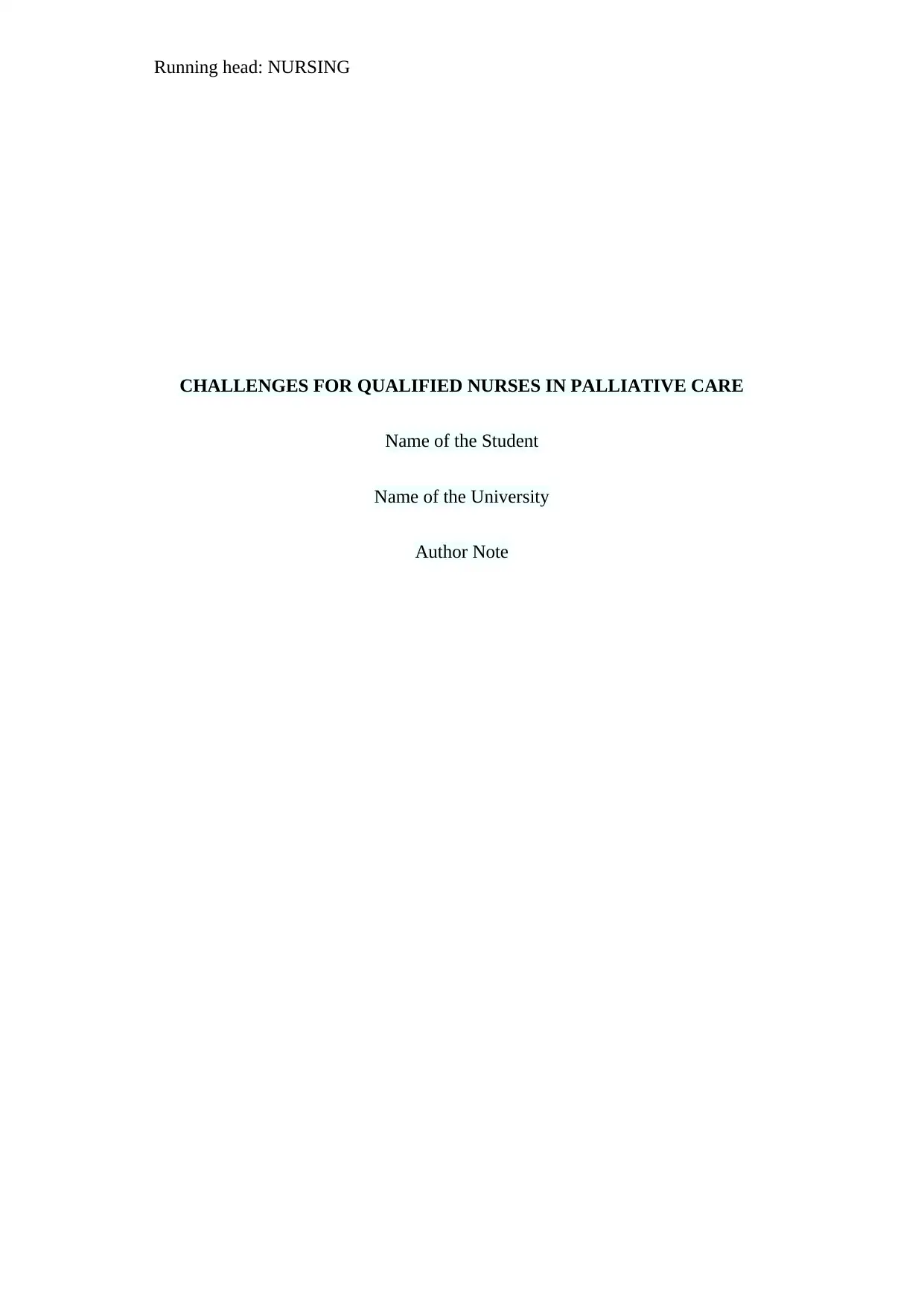
Running head: NURSING
CHALLENGES FOR QUALIFIED NURSES IN PALLIATIVE CARE
Name of the Student
Name of the University
Author Note
CHALLENGES FOR QUALIFIED NURSES IN PALLIATIVE CARE
Name of the Student
Name of the University
Author Note
Paraphrase This Document
Need a fresh take? Get an instant paraphrase of this document with our AI Paraphraser
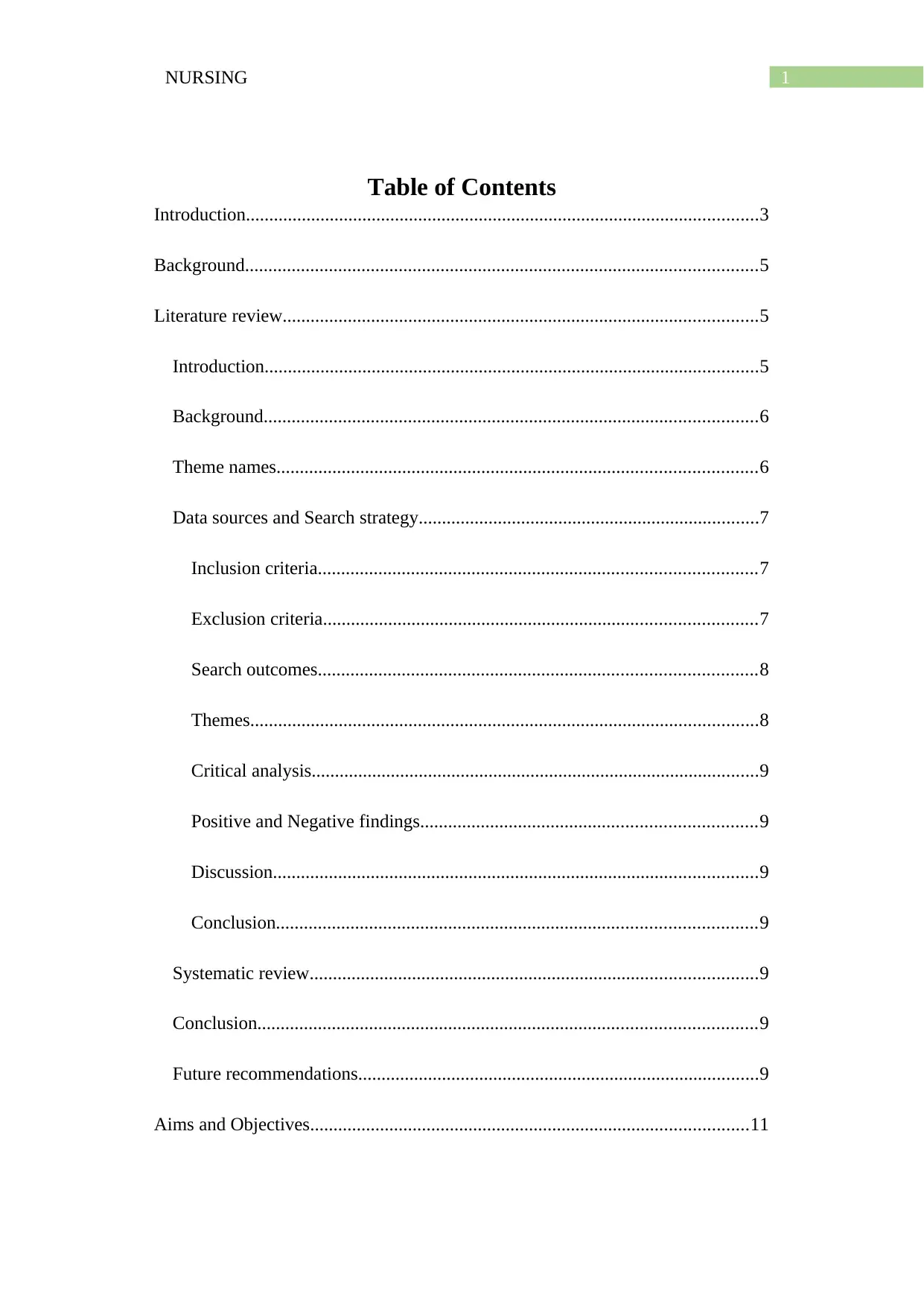
1NURSING
Table of Contents
Introduction..............................................................................................................3
Background..............................................................................................................5
Literature review......................................................................................................5
Introduction..........................................................................................................5
Background..........................................................................................................6
Theme names.......................................................................................................6
Data sources and Search strategy.........................................................................7
Inclusion criteria..............................................................................................7
Exclusion criteria.............................................................................................7
Search outcomes..............................................................................................8
Themes.............................................................................................................8
Critical analysis................................................................................................9
Positive and Negative findings........................................................................9
Discussion........................................................................................................9
Conclusion.......................................................................................................9
Systematic review................................................................................................9
Conclusion...........................................................................................................9
Future recommendations......................................................................................9
Aims and Objectives..............................................................................................11
Table of Contents
Introduction..............................................................................................................3
Background..............................................................................................................5
Literature review......................................................................................................5
Introduction..........................................................................................................5
Background..........................................................................................................6
Theme names.......................................................................................................6
Data sources and Search strategy.........................................................................7
Inclusion criteria..............................................................................................7
Exclusion criteria.............................................................................................7
Search outcomes..............................................................................................8
Themes.............................................................................................................8
Critical analysis................................................................................................9
Positive and Negative findings........................................................................9
Discussion........................................................................................................9
Conclusion.......................................................................................................9
Systematic review................................................................................................9
Conclusion...........................................................................................................9
Future recommendations......................................................................................9
Aims and Objectives..............................................................................................11
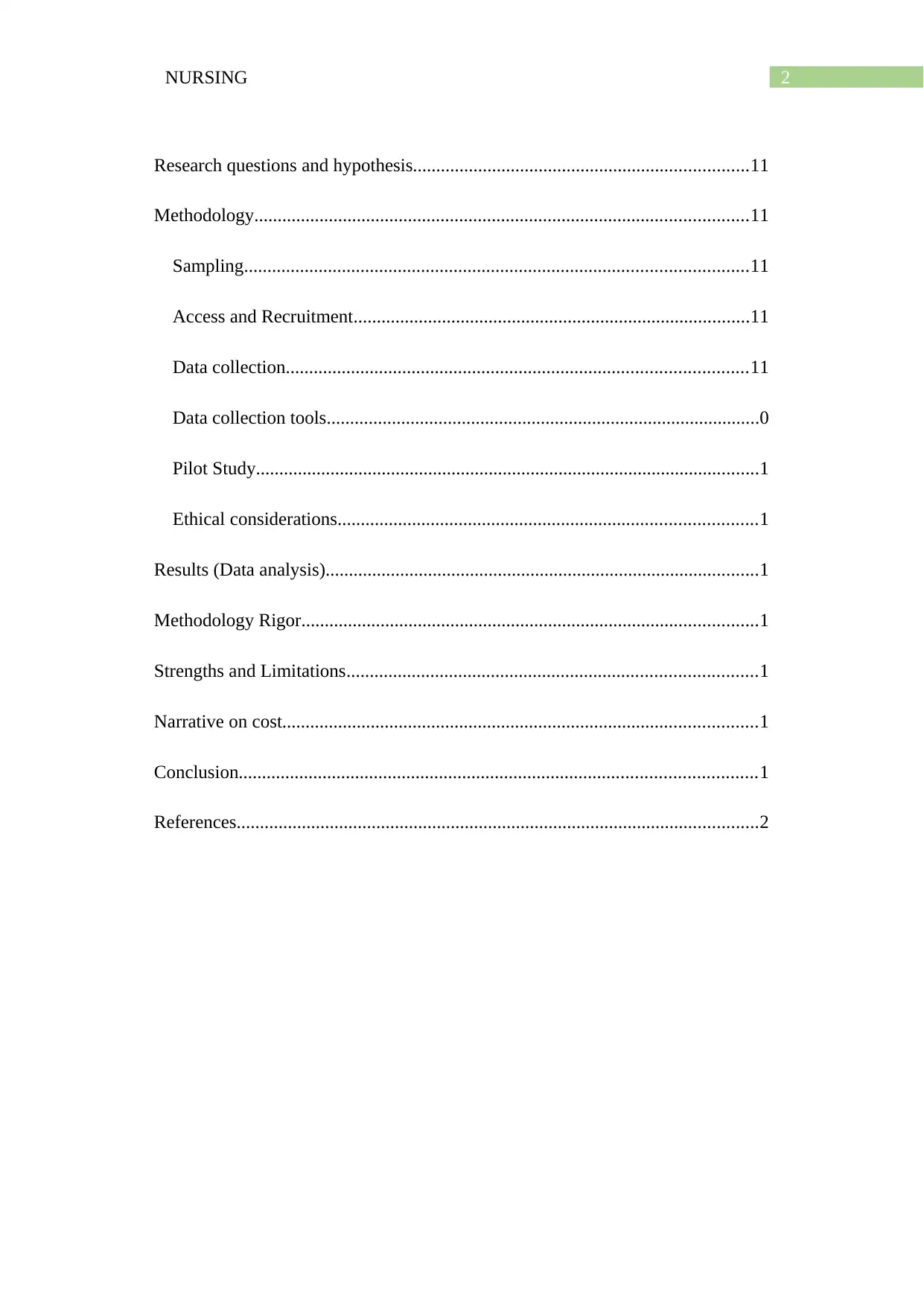
2NURSING
Research questions and hypothesis........................................................................11
Methodology..........................................................................................................11
Sampling............................................................................................................11
Access and Recruitment.....................................................................................11
Data collection...................................................................................................11
Data collection tools.............................................................................................0
Pilot Study............................................................................................................1
Ethical considerations..........................................................................................1
Results (Data analysis).............................................................................................1
Methodology Rigor..................................................................................................1
Strengths and Limitations........................................................................................1
Narrative on cost......................................................................................................1
Conclusion...............................................................................................................1
References................................................................................................................2
Research questions and hypothesis........................................................................11
Methodology..........................................................................................................11
Sampling............................................................................................................11
Access and Recruitment.....................................................................................11
Data collection...................................................................................................11
Data collection tools.............................................................................................0
Pilot Study............................................................................................................1
Ethical considerations..........................................................................................1
Results (Data analysis).............................................................................................1
Methodology Rigor..................................................................................................1
Strengths and Limitations........................................................................................1
Narrative on cost......................................................................................................1
Conclusion...............................................................................................................1
References................................................................................................................2
⊘ This is a preview!⊘
Do you want full access?
Subscribe today to unlock all pages.

Trusted by 1+ million students worldwide
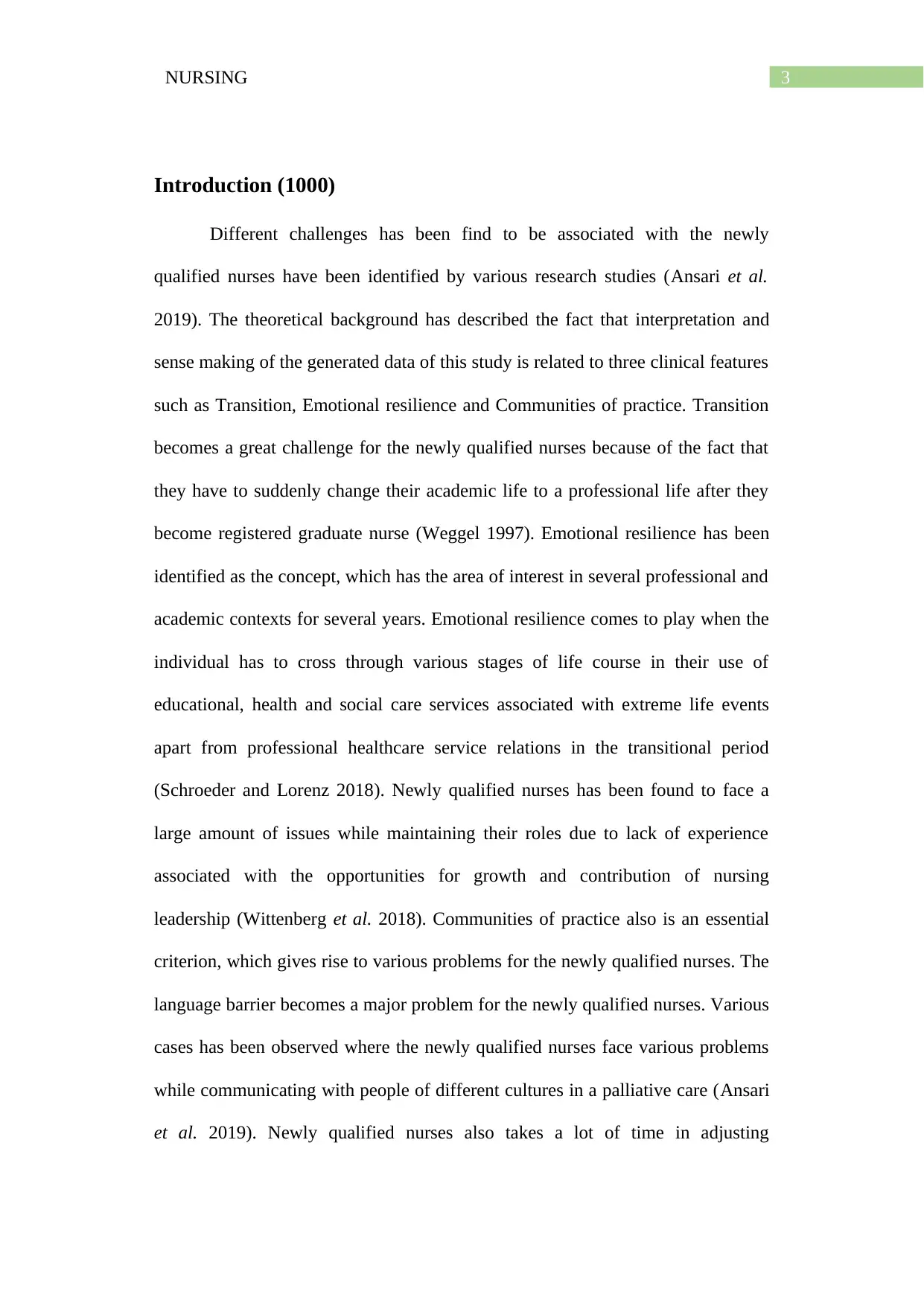
3NURSING
Introduction (1000)
Different challenges has been find to be associated with the newly
qualified nurses have been identified by various research studies (Ansari et al.
2019). The theoretical background has described the fact that interpretation and
sense making of the generated data of this study is related to three clinical features
such as Transition, Emotional resilience and Communities of practice. Transition
becomes a great challenge for the newly qualified nurses because of the fact that
they have to suddenly change their academic life to a professional life after they
become registered graduate nurse (Weggel 1997). Emotional resilience has been
identified as the concept, which has the area of interest in several professional and
academic contexts for several years. Emotional resilience comes to play when the
individual has to cross through various stages of life course in their use of
educational, health and social care services associated with extreme life events
apart from professional healthcare service relations in the transitional period
(Schroeder and Lorenz 2018). Newly qualified nurses has been found to face a
large amount of issues while maintaining their roles due to lack of experience
associated with the opportunities for growth and contribution of nursing
leadership (Wittenberg et al. 2018). Communities of practice also is an essential
criterion, which gives rise to various problems for the newly qualified nurses. The
language barrier becomes a major problem for the newly qualified nurses. Various
cases has been observed where the newly qualified nurses face various problems
while communicating with people of different cultures in a palliative care (Ansari
et al. 2019). Newly qualified nurses also takes a lot of time in adjusting
Introduction (1000)
Different challenges has been find to be associated with the newly
qualified nurses have been identified by various research studies (Ansari et al.
2019). The theoretical background has described the fact that interpretation and
sense making of the generated data of this study is related to three clinical features
such as Transition, Emotional resilience and Communities of practice. Transition
becomes a great challenge for the newly qualified nurses because of the fact that
they have to suddenly change their academic life to a professional life after they
become registered graduate nurse (Weggel 1997). Emotional resilience has been
identified as the concept, which has the area of interest in several professional and
academic contexts for several years. Emotional resilience comes to play when the
individual has to cross through various stages of life course in their use of
educational, health and social care services associated with extreme life events
apart from professional healthcare service relations in the transitional period
(Schroeder and Lorenz 2018). Newly qualified nurses has been found to face a
large amount of issues while maintaining their roles due to lack of experience
associated with the opportunities for growth and contribution of nursing
leadership (Wittenberg et al. 2018). Communities of practice also is an essential
criterion, which gives rise to various problems for the newly qualified nurses. The
language barrier becomes a major problem for the newly qualified nurses. Various
cases has been observed where the newly qualified nurses face various problems
while communicating with people of different cultures in a palliative care (Ansari
et al. 2019). Newly qualified nurses also takes a lot of time in adjusting
Paraphrase This Document
Need a fresh take? Get an instant paraphrase of this document with our AI Paraphraser
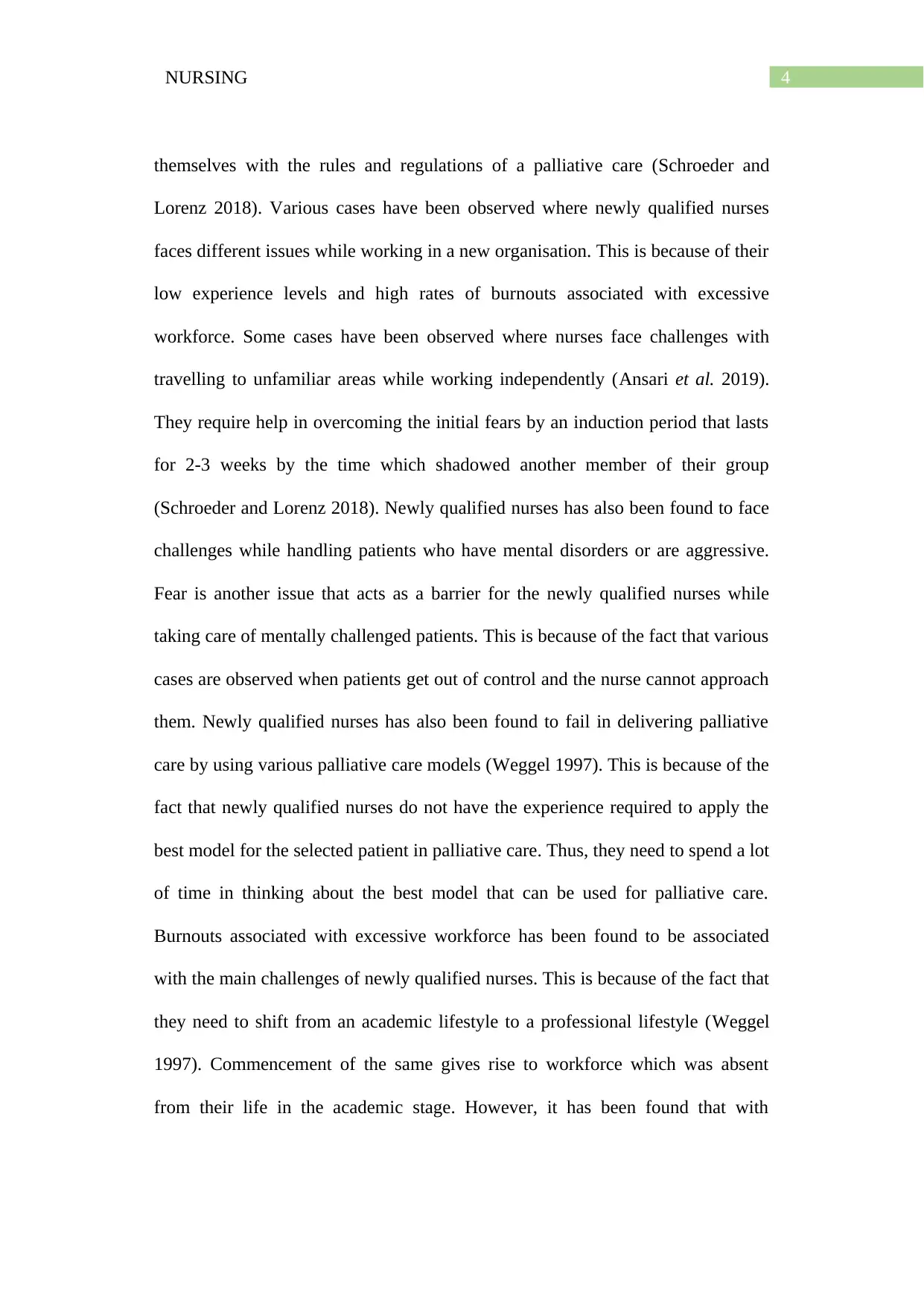
4NURSING
themselves with the rules and regulations of a palliative care (Schroeder and
Lorenz 2018). Various cases have been observed where newly qualified nurses
faces different issues while working in a new organisation. This is because of their
low experience levels and high rates of burnouts associated with excessive
workforce. Some cases have been observed where nurses face challenges with
travelling to unfamiliar areas while working independently (Ansari et al. 2019).
They require help in overcoming the initial fears by an induction period that lasts
for 2-3 weeks by the time which shadowed another member of their group
(Schroeder and Lorenz 2018). Newly qualified nurses has also been found to face
challenges while handling patients who have mental disorders or are aggressive.
Fear is another issue that acts as a barrier for the newly qualified nurses while
taking care of mentally challenged patients. This is because of the fact that various
cases are observed when patients get out of control and the nurse cannot approach
them. Newly qualified nurses has also been found to fail in delivering palliative
care by using various palliative care models (Weggel 1997). This is because of the
fact that newly qualified nurses do not have the experience required to apply the
best model for the selected patient in palliative care. Thus, they need to spend a lot
of time in thinking about the best model that can be used for palliative care.
Burnouts associated with excessive workforce has been found to be associated
with the main challenges of newly qualified nurses. This is because of the fact that
they need to shift from an academic lifestyle to a professional lifestyle (Weggel
1997). Commencement of the same gives rise to workforce which was absent
from their life in the academic stage. However, it has been found that with
themselves with the rules and regulations of a palliative care (Schroeder and
Lorenz 2018). Various cases have been observed where newly qualified nurses
faces different issues while working in a new organisation. This is because of their
low experience levels and high rates of burnouts associated with excessive
workforce. Some cases have been observed where nurses face challenges with
travelling to unfamiliar areas while working independently (Ansari et al. 2019).
They require help in overcoming the initial fears by an induction period that lasts
for 2-3 weeks by the time which shadowed another member of their group
(Schroeder and Lorenz 2018). Newly qualified nurses has also been found to face
challenges while handling patients who have mental disorders or are aggressive.
Fear is another issue that acts as a barrier for the newly qualified nurses while
taking care of mentally challenged patients. This is because of the fact that various
cases are observed when patients get out of control and the nurse cannot approach
them. Newly qualified nurses has also been found to fail in delivering palliative
care by using various palliative care models (Weggel 1997). This is because of the
fact that newly qualified nurses do not have the experience required to apply the
best model for the selected patient in palliative care. Thus, they need to spend a lot
of time in thinking about the best model that can be used for palliative care.
Burnouts associated with excessive workforce has been found to be associated
with the main challenges of newly qualified nurses. This is because of the fact that
they need to shift from an academic lifestyle to a professional lifestyle (Weggel
1997). Commencement of the same gives rise to workforce which was absent
from their life in the academic stage. However, it has been found that with
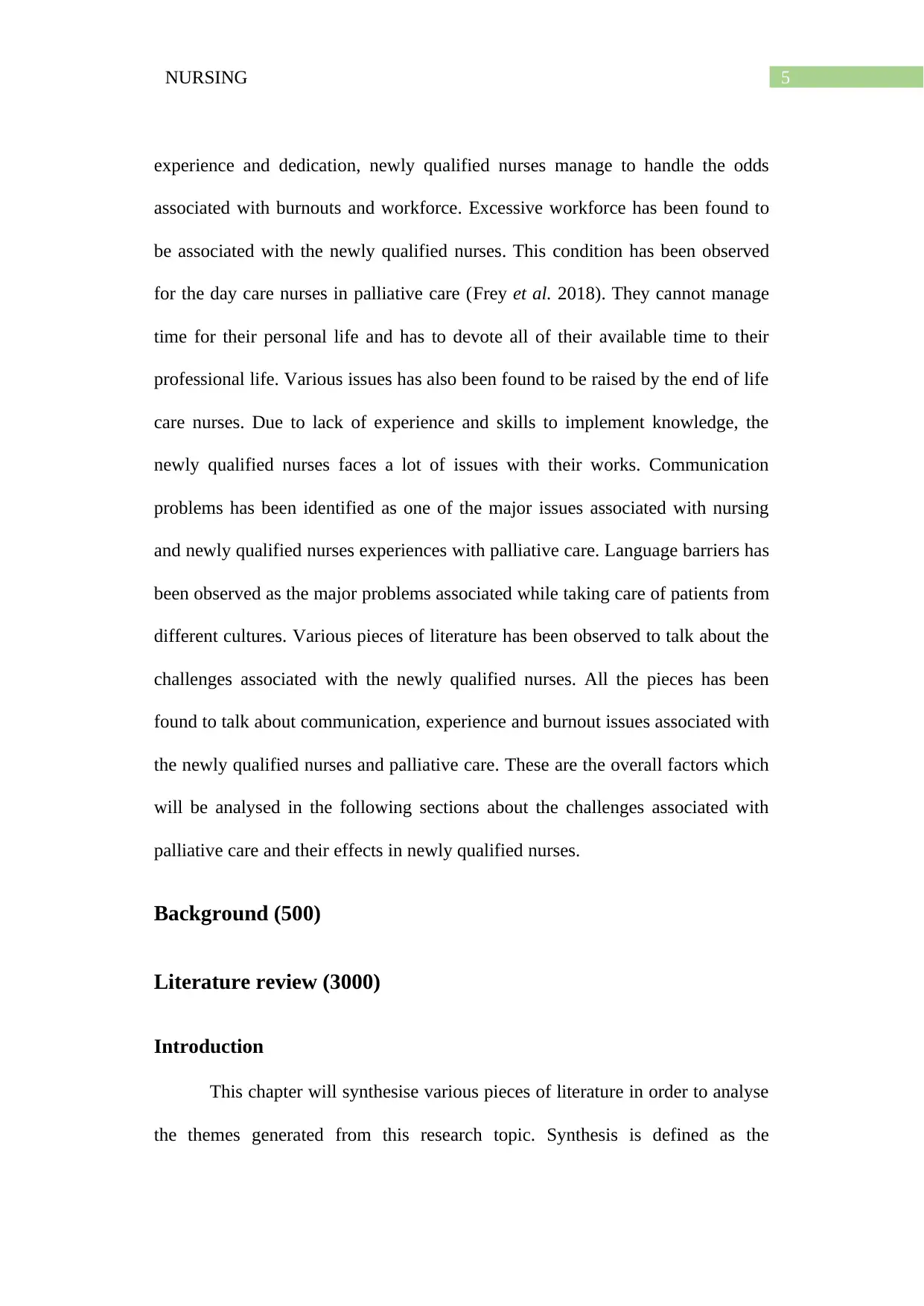
5NURSING
experience and dedication, newly qualified nurses manage to handle the odds
associated with burnouts and workforce. Excessive workforce has been found to
be associated with the newly qualified nurses. This condition has been observed
for the day care nurses in palliative care (Frey et al. 2018). They cannot manage
time for their personal life and has to devote all of their available time to their
professional life. Various issues has also been found to be raised by the end of life
care nurses. Due to lack of experience and skills to implement knowledge, the
newly qualified nurses faces a lot of issues with their works. Communication
problems has been identified as one of the major issues associated with nursing
and newly qualified nurses experiences with palliative care. Language barriers has
been observed as the major problems associated while taking care of patients from
different cultures. Various pieces of literature has been observed to talk about the
challenges associated with the newly qualified nurses. All the pieces has been
found to talk about communication, experience and burnout issues associated with
the newly qualified nurses and palliative care. These are the overall factors which
will be analysed in the following sections about the challenges associated with
palliative care and their effects in newly qualified nurses.
Background (500)
Literature review (3000)
Introduction
This chapter will synthesise various pieces of literature in order to analyse
the themes generated from this research topic. Synthesis is defined as the
experience and dedication, newly qualified nurses manage to handle the odds
associated with burnouts and workforce. Excessive workforce has been found to
be associated with the newly qualified nurses. This condition has been observed
for the day care nurses in palliative care (Frey et al. 2018). They cannot manage
time for their personal life and has to devote all of their available time to their
professional life. Various issues has also been found to be raised by the end of life
care nurses. Due to lack of experience and skills to implement knowledge, the
newly qualified nurses faces a lot of issues with their works. Communication
problems has been identified as one of the major issues associated with nursing
and newly qualified nurses experiences with palliative care. Language barriers has
been observed as the major problems associated while taking care of patients from
different cultures. Various pieces of literature has been observed to talk about the
challenges associated with the newly qualified nurses. All the pieces has been
found to talk about communication, experience and burnout issues associated with
the newly qualified nurses and palliative care. These are the overall factors which
will be analysed in the following sections about the challenges associated with
palliative care and their effects in newly qualified nurses.
Background (500)
Literature review (3000)
Introduction
This chapter will synthesise various pieces of literature in order to analyse
the themes generated from this research topic. Synthesis is defined as the
⊘ This is a preview!⊘
Do you want full access?
Subscribe today to unlock all pages.

Trusted by 1+ million students worldwide
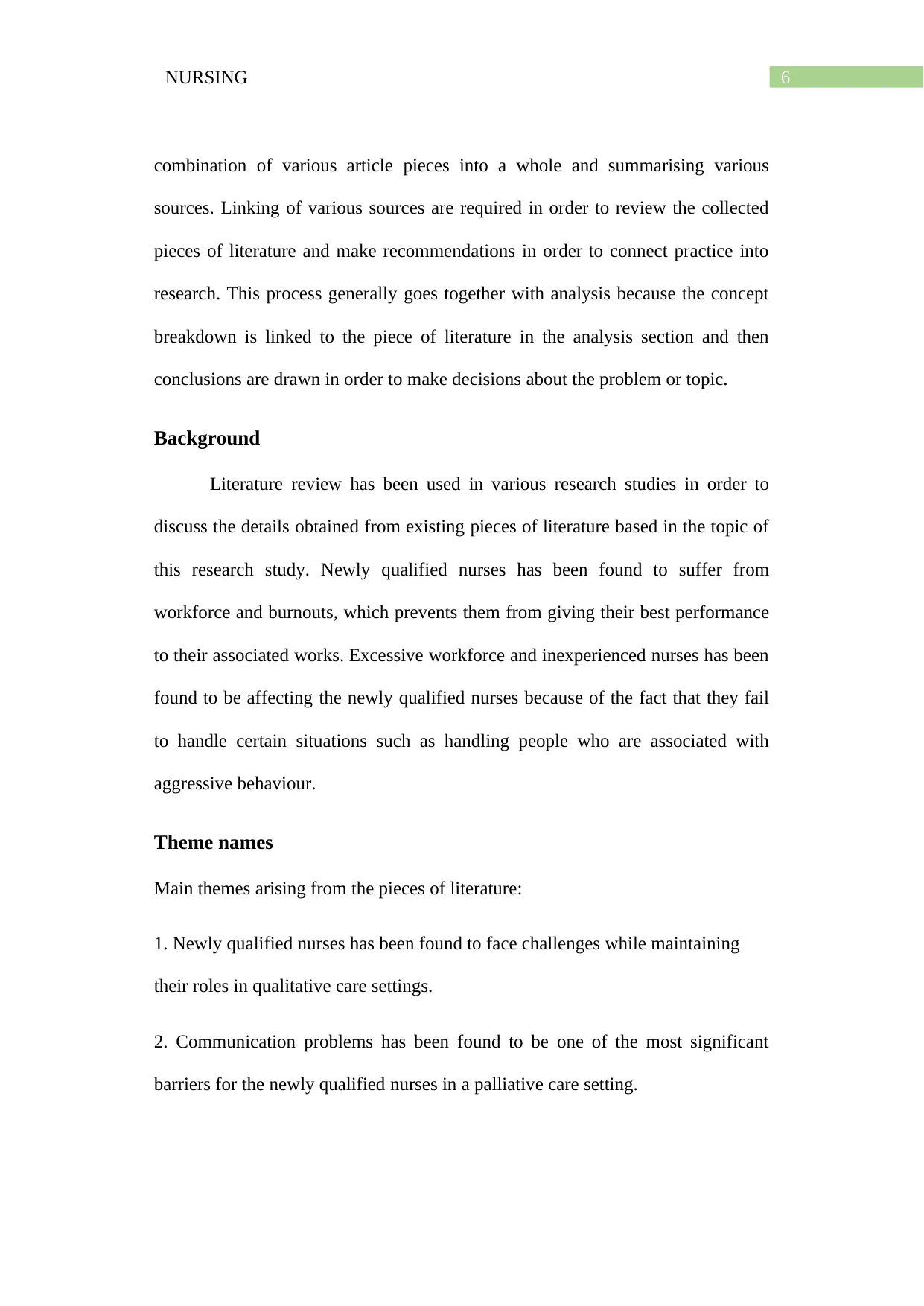
6NURSING
combination of various article pieces into a whole and summarising various
sources. Linking of various sources are required in order to review the collected
pieces of literature and make recommendations in order to connect practice into
research. This process generally goes together with analysis because the concept
breakdown is linked to the piece of literature in the analysis section and then
conclusions are drawn in order to make decisions about the problem or topic.
Background
Literature review has been used in various research studies in order to
discuss the details obtained from existing pieces of literature based in the topic of
this research study. Newly qualified nurses has been found to suffer from
workforce and burnouts, which prevents them from giving their best performance
to their associated works. Excessive workforce and inexperienced nurses has been
found to be affecting the newly qualified nurses because of the fact that they fail
to handle certain situations such as handling people who are associated with
aggressive behaviour.
Theme names
Main themes arising from the pieces of literature:
1. Newly qualified nurses has been found to face challenges while maintaining
their roles in qualitative care settings.
2. Communication problems has been found to be one of the most significant
barriers for the newly qualified nurses in a palliative care setting.
combination of various article pieces into a whole and summarising various
sources. Linking of various sources are required in order to review the collected
pieces of literature and make recommendations in order to connect practice into
research. This process generally goes together with analysis because the concept
breakdown is linked to the piece of literature in the analysis section and then
conclusions are drawn in order to make decisions about the problem or topic.
Background
Literature review has been used in various research studies in order to
discuss the details obtained from existing pieces of literature based in the topic of
this research study. Newly qualified nurses has been found to suffer from
workforce and burnouts, which prevents them from giving their best performance
to their associated works. Excessive workforce and inexperienced nurses has been
found to be affecting the newly qualified nurses because of the fact that they fail
to handle certain situations such as handling people who are associated with
aggressive behaviour.
Theme names
Main themes arising from the pieces of literature:
1. Newly qualified nurses has been found to face challenges while maintaining
their roles in qualitative care settings.
2. Communication problems has been found to be one of the most significant
barriers for the newly qualified nurses in a palliative care setting.
Paraphrase This Document
Need a fresh take? Get an instant paraphrase of this document with our AI Paraphraser
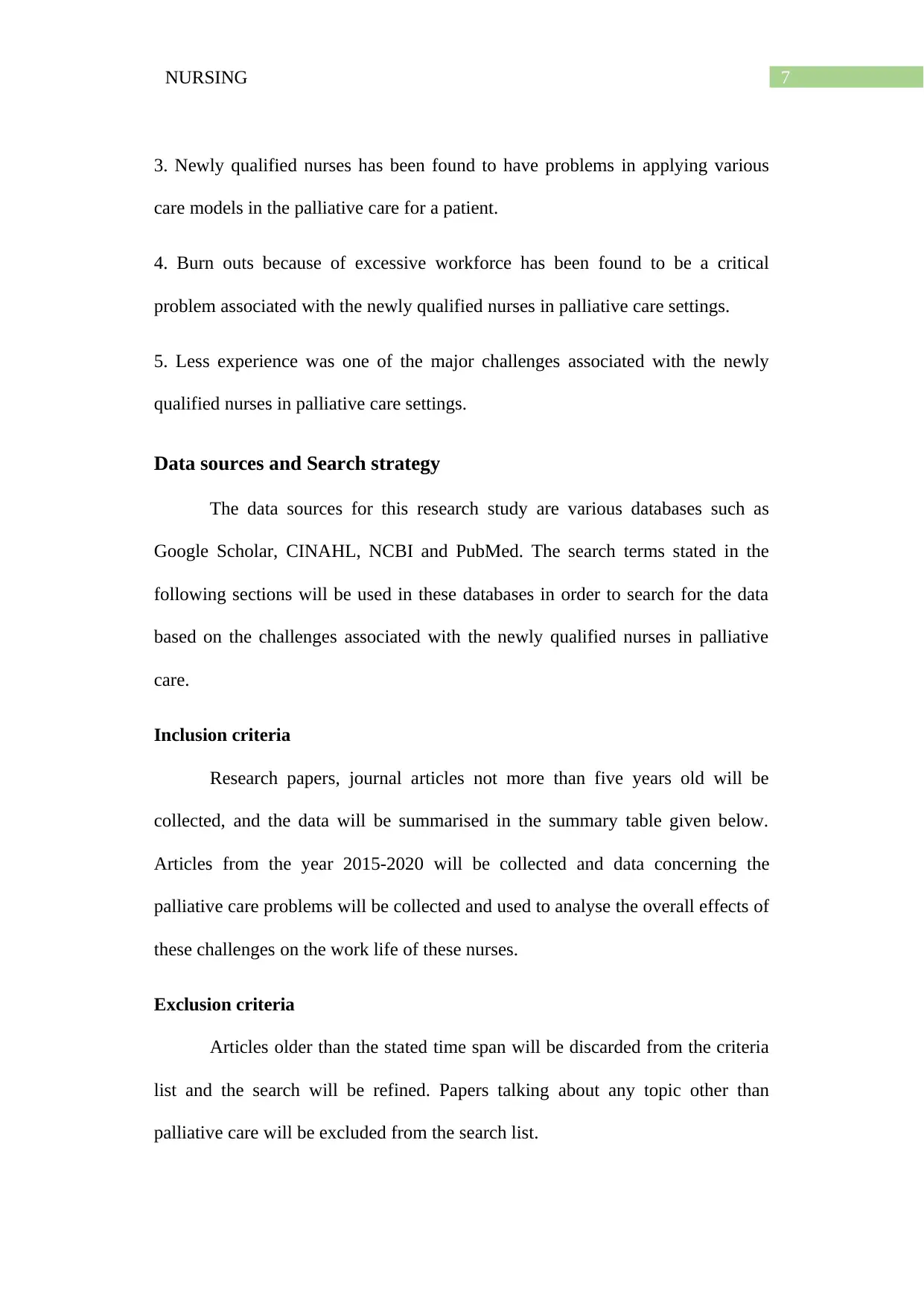
7NURSING
3. Newly qualified nurses has been found to have problems in applying various
care models in the palliative care for a patient.
4. Burn outs because of excessive workforce has been found to be a critical
problem associated with the newly qualified nurses in palliative care settings.
5. Less experience was one of the major challenges associated with the newly
qualified nurses in palliative care settings.
Data sources and Search strategy
The data sources for this research study are various databases such as
Google Scholar, CINAHL, NCBI and PubMed. The search terms stated in the
following sections will be used in these databases in order to search for the data
based on the challenges associated with the newly qualified nurses in palliative
care.
Inclusion criteria
Research papers, journal articles not more than five years old will be
collected, and the data will be summarised in the summary table given below.
Articles from the year 2015-2020 will be collected and data concerning the
palliative care problems will be collected and used to analyse the overall effects of
these challenges on the work life of these nurses.
Exclusion criteria
Articles older than the stated time span will be discarded from the criteria
list and the search will be refined. Papers talking about any topic other than
palliative care will be excluded from the search list.
3. Newly qualified nurses has been found to have problems in applying various
care models in the palliative care for a patient.
4. Burn outs because of excessive workforce has been found to be a critical
problem associated with the newly qualified nurses in palliative care settings.
5. Less experience was one of the major challenges associated with the newly
qualified nurses in palliative care settings.
Data sources and Search strategy
The data sources for this research study are various databases such as
Google Scholar, CINAHL, NCBI and PubMed. The search terms stated in the
following sections will be used in these databases in order to search for the data
based on the challenges associated with the newly qualified nurses in palliative
care.
Inclusion criteria
Research papers, journal articles not more than five years old will be
collected, and the data will be summarised in the summary table given below.
Articles from the year 2015-2020 will be collected and data concerning the
palliative care problems will be collected and used to analyse the overall effects of
these challenges on the work life of these nurses.
Exclusion criteria
Articles older than the stated time span will be discarded from the criteria
list and the search will be refined. Papers talking about any topic other than
palliative care will be excluded from the search list.
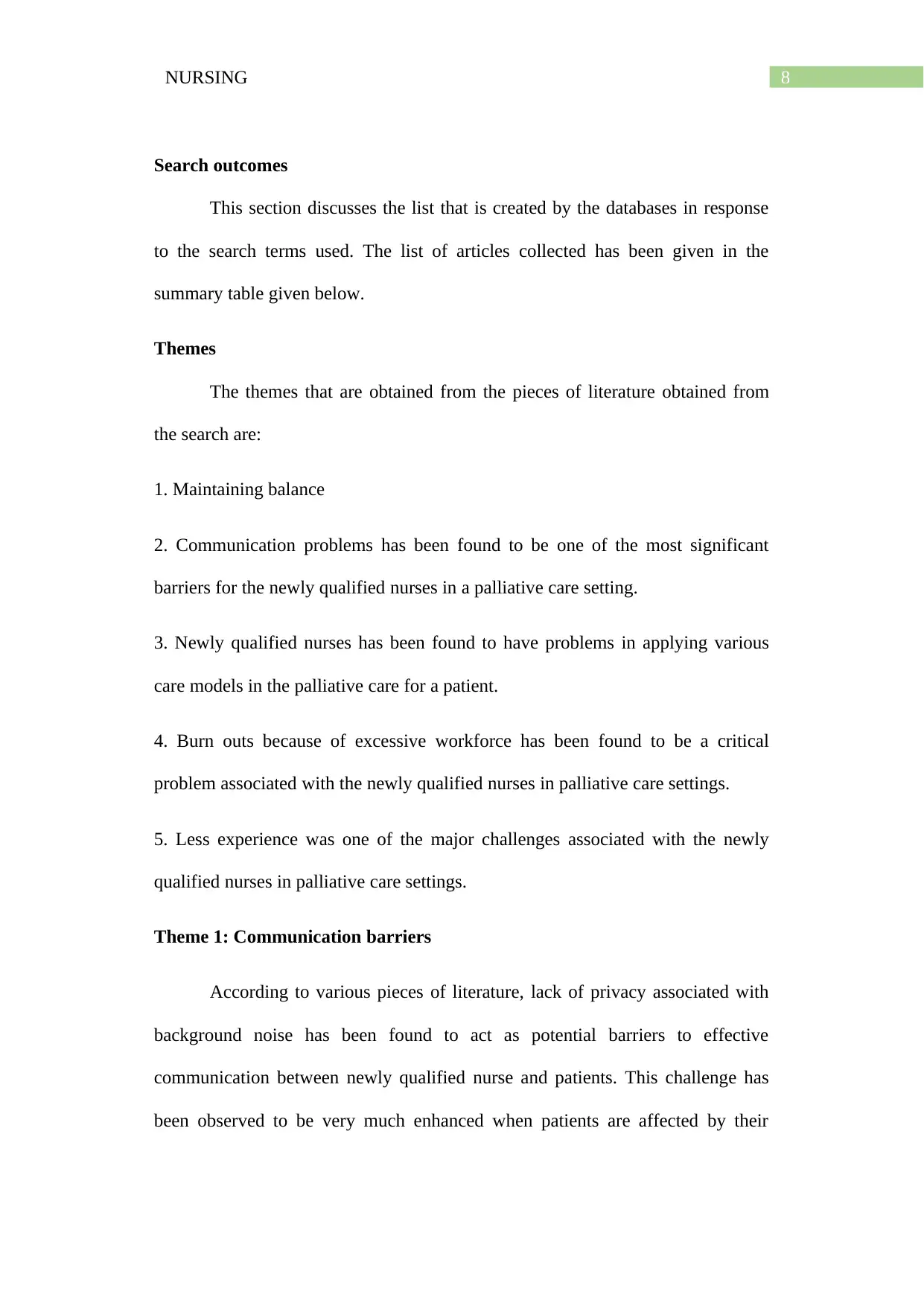
8NURSING
Search outcomes
This section discusses the list that is created by the databases in response
to the search terms used. The list of articles collected has been given in the
summary table given below.
Themes
The themes that are obtained from the pieces of literature obtained from
the search are:
1. Maintaining balance
2. Communication problems has been found to be one of the most significant
barriers for the newly qualified nurses in a palliative care setting.
3. Newly qualified nurses has been found to have problems in applying various
care models in the palliative care for a patient.
4. Burn outs because of excessive workforce has been found to be a critical
problem associated with the newly qualified nurses in palliative care settings.
5. Less experience was one of the major challenges associated with the newly
qualified nurses in palliative care settings.
Theme 1: Communication barriers
According to various pieces of literature, lack of privacy associated with
background noise has been found to act as potential barriers to effective
communication between newly qualified nurse and patients. This challenge has
been observed to be very much enhanced when patients are affected by their
Search outcomes
This section discusses the list that is created by the databases in response
to the search terms used. The list of articles collected has been given in the
summary table given below.
Themes
The themes that are obtained from the pieces of literature obtained from
the search are:
1. Maintaining balance
2. Communication problems has been found to be one of the most significant
barriers for the newly qualified nurses in a palliative care setting.
3. Newly qualified nurses has been found to have problems in applying various
care models in the palliative care for a patient.
4. Burn outs because of excessive workforce has been found to be a critical
problem associated with the newly qualified nurses in palliative care settings.
5. Less experience was one of the major challenges associated with the newly
qualified nurses in palliative care settings.
Theme 1: Communication barriers
According to various pieces of literature, lack of privacy associated with
background noise has been found to act as potential barriers to effective
communication between newly qualified nurse and patients. This challenge has
been observed to be very much enhanced when patients are affected by their
⊘ This is a preview!⊘
Do you want full access?
Subscribe today to unlock all pages.

Trusted by 1+ million students worldwide
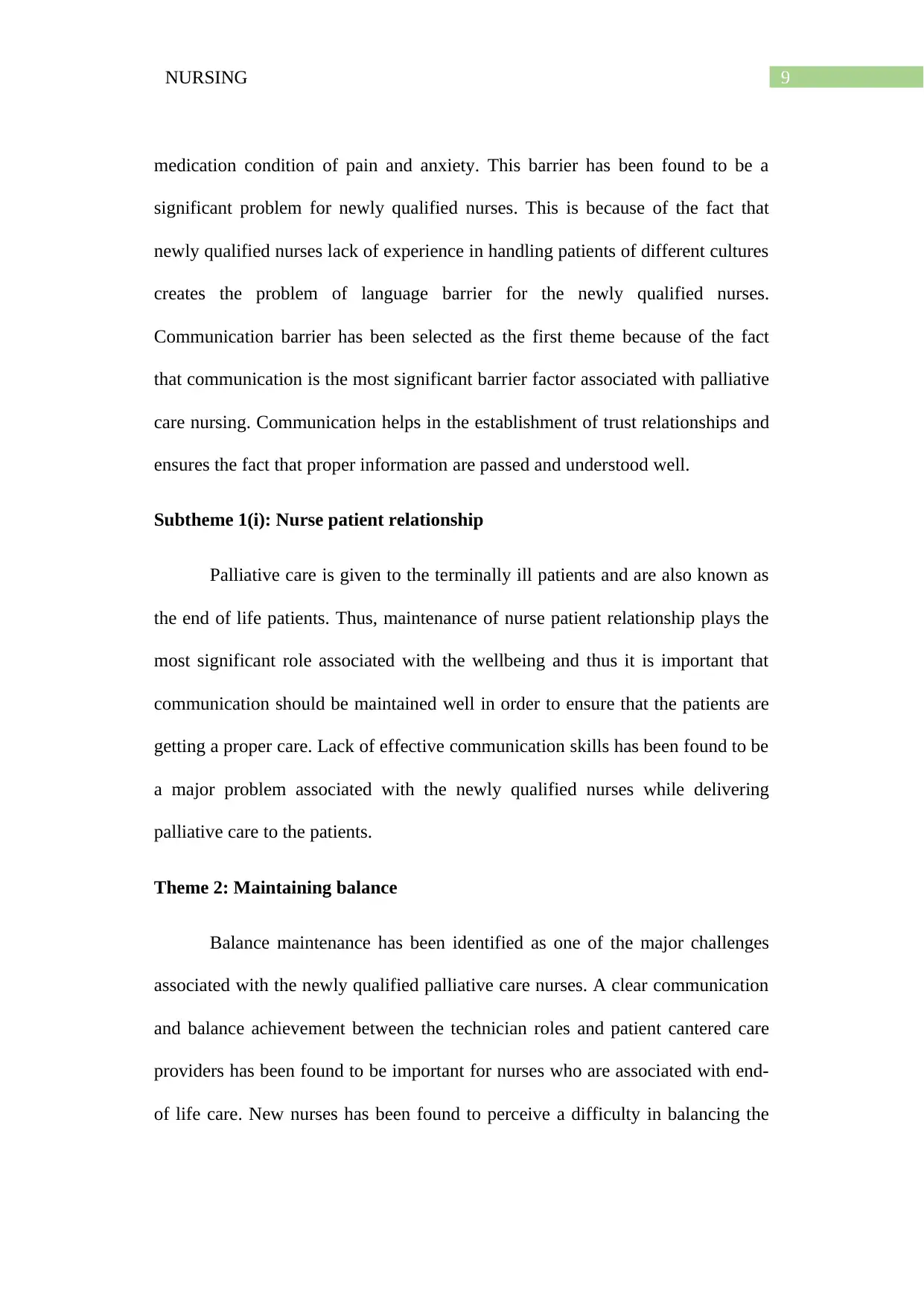
9NURSING
medication condition of pain and anxiety. This barrier has been found to be a
significant problem for newly qualified nurses. This is because of the fact that
newly qualified nurses lack of experience in handling patients of different cultures
creates the problem of language barrier for the newly qualified nurses.
Communication barrier has been selected as the first theme because of the fact
that communication is the most significant barrier factor associated with palliative
care nursing. Communication helps in the establishment of trust relationships and
ensures the fact that proper information are passed and understood well.
Subtheme 1(i): Nurse patient relationship
Palliative care is given to the terminally ill patients and are also known as
the end of life patients. Thus, maintenance of nurse patient relationship plays the
most significant role associated with the wellbeing and thus it is important that
communication should be maintained well in order to ensure that the patients are
getting a proper care. Lack of effective communication skills has been found to be
a major problem associated with the newly qualified nurses while delivering
palliative care to the patients.
Theme 2: Maintaining balance
Balance maintenance has been identified as one of the major challenges
associated with the newly qualified palliative care nurses. A clear communication
and balance achievement between the technician roles and patient cantered care
providers has been found to be important for nurses who are associated with end-
of life care. New nurses has been found to perceive a difficulty in balancing the
medication condition of pain and anxiety. This barrier has been found to be a
significant problem for newly qualified nurses. This is because of the fact that
newly qualified nurses lack of experience in handling patients of different cultures
creates the problem of language barrier for the newly qualified nurses.
Communication barrier has been selected as the first theme because of the fact
that communication is the most significant barrier factor associated with palliative
care nursing. Communication helps in the establishment of trust relationships and
ensures the fact that proper information are passed and understood well.
Subtheme 1(i): Nurse patient relationship
Palliative care is given to the terminally ill patients and are also known as
the end of life patients. Thus, maintenance of nurse patient relationship plays the
most significant role associated with the wellbeing and thus it is important that
communication should be maintained well in order to ensure that the patients are
getting a proper care. Lack of effective communication skills has been found to be
a major problem associated with the newly qualified nurses while delivering
palliative care to the patients.
Theme 2: Maintaining balance
Balance maintenance has been identified as one of the major challenges
associated with the newly qualified palliative care nurses. A clear communication
and balance achievement between the technician roles and patient cantered care
providers has been found to be important for nurses who are associated with end-
of life care. New nurses has been found to perceive a difficulty in balancing the
Paraphrase This Document
Need a fresh take? Get an instant paraphrase of this document with our AI Paraphraser
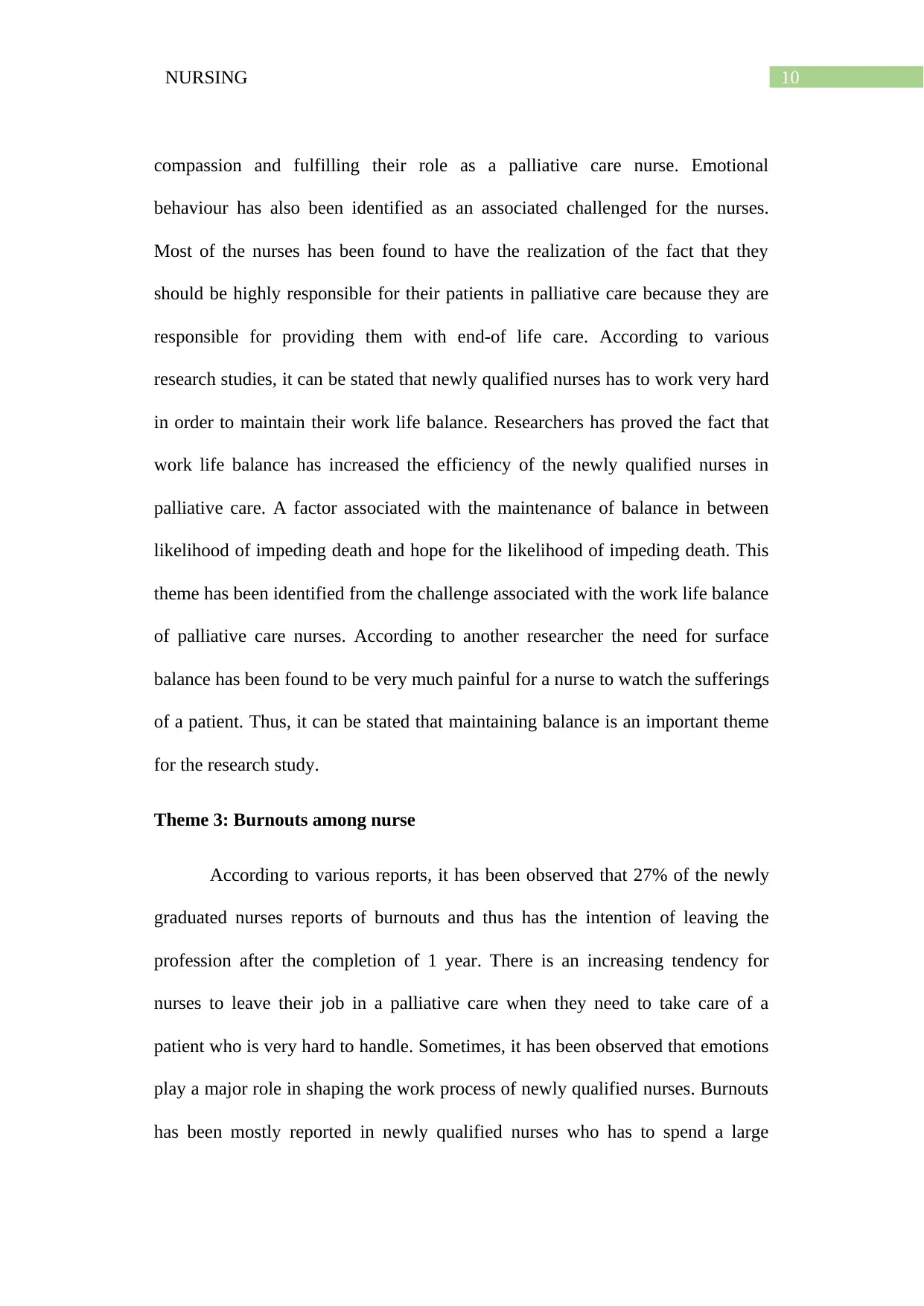
10NURSING
compassion and fulfilling their role as a palliative care nurse. Emotional
behaviour has also been identified as an associated challenged for the nurses.
Most of the nurses has been found to have the realization of the fact that they
should be highly responsible for their patients in palliative care because they are
responsible for providing them with end-of life care. According to various
research studies, it can be stated that newly qualified nurses has to work very hard
in order to maintain their work life balance. Researchers has proved the fact that
work life balance has increased the efficiency of the newly qualified nurses in
palliative care. A factor associated with the maintenance of balance in between
likelihood of impeding death and hope for the likelihood of impeding death. This
theme has been identified from the challenge associated with the work life balance
of palliative care nurses. According to another researcher the need for surface
balance has been found to be very much painful for a nurse to watch the sufferings
of a patient. Thus, it can be stated that maintaining balance is an important theme
for the research study.
Theme 3: Burnouts among nurse
According to various reports, it has been observed that 27% of the newly
graduated nurses reports of burnouts and thus has the intention of leaving the
profession after the completion of 1 year. There is an increasing tendency for
nurses to leave their job in a palliative care when they need to take care of a
patient who is very hard to handle. Sometimes, it has been observed that emotions
play a major role in shaping the work process of newly qualified nurses. Burnouts
has been mostly reported in newly qualified nurses who has to spend a large
compassion and fulfilling their role as a palliative care nurse. Emotional
behaviour has also been identified as an associated challenged for the nurses.
Most of the nurses has been found to have the realization of the fact that they
should be highly responsible for their patients in palliative care because they are
responsible for providing them with end-of life care. According to various
research studies, it can be stated that newly qualified nurses has to work very hard
in order to maintain their work life balance. Researchers has proved the fact that
work life balance has increased the efficiency of the newly qualified nurses in
palliative care. A factor associated with the maintenance of balance in between
likelihood of impeding death and hope for the likelihood of impeding death. This
theme has been identified from the challenge associated with the work life balance
of palliative care nurses. According to another researcher the need for surface
balance has been found to be very much painful for a nurse to watch the sufferings
of a patient. Thus, it can be stated that maintaining balance is an important theme
for the research study.
Theme 3: Burnouts among nurse
According to various reports, it has been observed that 27% of the newly
graduated nurses reports of burnouts and thus has the intention of leaving the
profession after the completion of 1 year. There is an increasing tendency for
nurses to leave their job in a palliative care when they need to take care of a
patient who is very hard to handle. Sometimes, it has been observed that emotions
play a major role in shaping the work process of newly qualified nurses. Burnouts
has been mostly reported in newly qualified nurses who has to spend a large
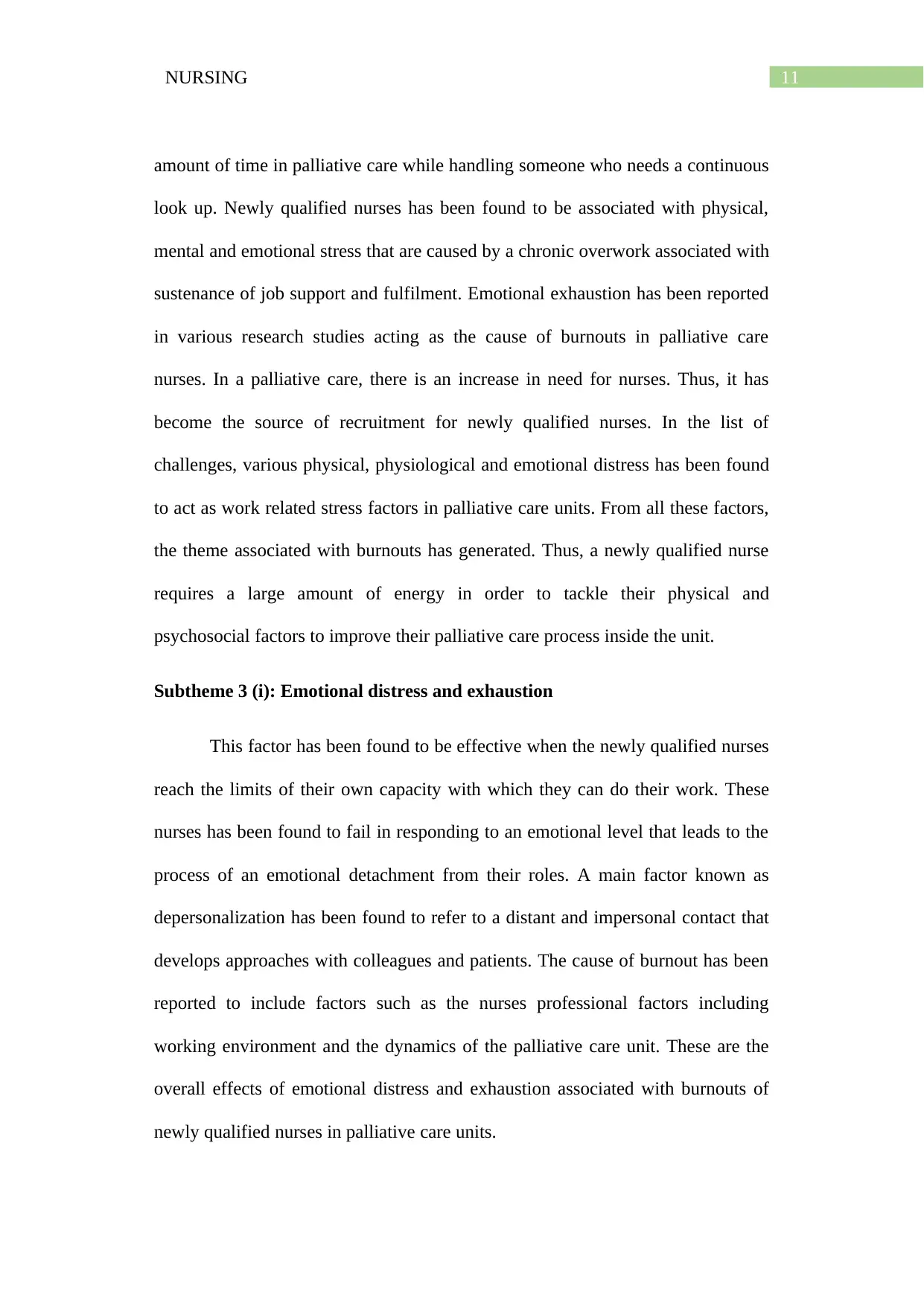
11NURSING
amount of time in palliative care while handling someone who needs a continuous
look up. Newly qualified nurses has been found to be associated with physical,
mental and emotional stress that are caused by a chronic overwork associated with
sustenance of job support and fulfilment. Emotional exhaustion has been reported
in various research studies acting as the cause of burnouts in palliative care
nurses. In a palliative care, there is an increase in need for nurses. Thus, it has
become the source of recruitment for newly qualified nurses. In the list of
challenges, various physical, physiological and emotional distress has been found
to act as work related stress factors in palliative care units. From all these factors,
the theme associated with burnouts has generated. Thus, a newly qualified nurse
requires a large amount of energy in order to tackle their physical and
psychosocial factors to improve their palliative care process inside the unit.
Subtheme 3 (i): Emotional distress and exhaustion
This factor has been found to be effective when the newly qualified nurses
reach the limits of their own capacity with which they can do their work. These
nurses has been found to fail in responding to an emotional level that leads to the
process of an emotional detachment from their roles. A main factor known as
depersonalization has been found to refer to a distant and impersonal contact that
develops approaches with colleagues and patients. The cause of burnout has been
reported to include factors such as the nurses professional factors including
working environment and the dynamics of the palliative care unit. These are the
overall effects of emotional distress and exhaustion associated with burnouts of
newly qualified nurses in palliative care units.
amount of time in palliative care while handling someone who needs a continuous
look up. Newly qualified nurses has been found to be associated with physical,
mental and emotional stress that are caused by a chronic overwork associated with
sustenance of job support and fulfilment. Emotional exhaustion has been reported
in various research studies acting as the cause of burnouts in palliative care
nurses. In a palliative care, there is an increase in need for nurses. Thus, it has
become the source of recruitment for newly qualified nurses. In the list of
challenges, various physical, physiological and emotional distress has been found
to act as work related stress factors in palliative care units. From all these factors,
the theme associated with burnouts has generated. Thus, a newly qualified nurse
requires a large amount of energy in order to tackle their physical and
psychosocial factors to improve their palliative care process inside the unit.
Subtheme 3 (i): Emotional distress and exhaustion
This factor has been found to be effective when the newly qualified nurses
reach the limits of their own capacity with which they can do their work. These
nurses has been found to fail in responding to an emotional level that leads to the
process of an emotional detachment from their roles. A main factor known as
depersonalization has been found to refer to a distant and impersonal contact that
develops approaches with colleagues and patients. The cause of burnout has been
reported to include factors such as the nurses professional factors including
working environment and the dynamics of the palliative care unit. These are the
overall effects of emotional distress and exhaustion associated with burnouts of
newly qualified nurses in palliative care units.
⊘ This is a preview!⊘
Do you want full access?
Subscribe today to unlock all pages.

Trusted by 1+ million students worldwide
1 out of 38
Related Documents
Your All-in-One AI-Powered Toolkit for Academic Success.
+13062052269
info@desklib.com
Available 24*7 on WhatsApp / Email
![[object Object]](/_next/static/media/star-bottom.7253800d.svg)
Unlock your academic potential
Copyright © 2020–2026 A2Z Services. All Rights Reserved. Developed and managed by ZUCOL.




